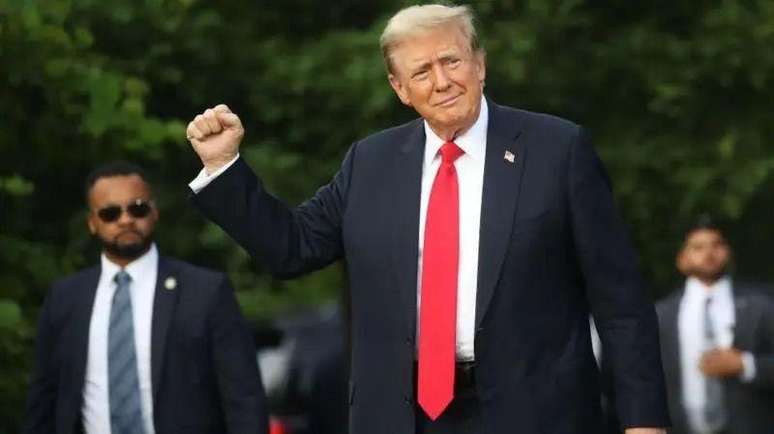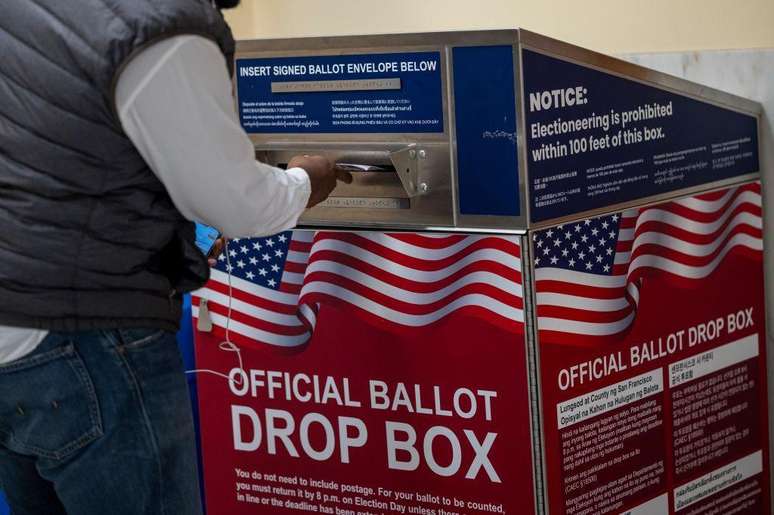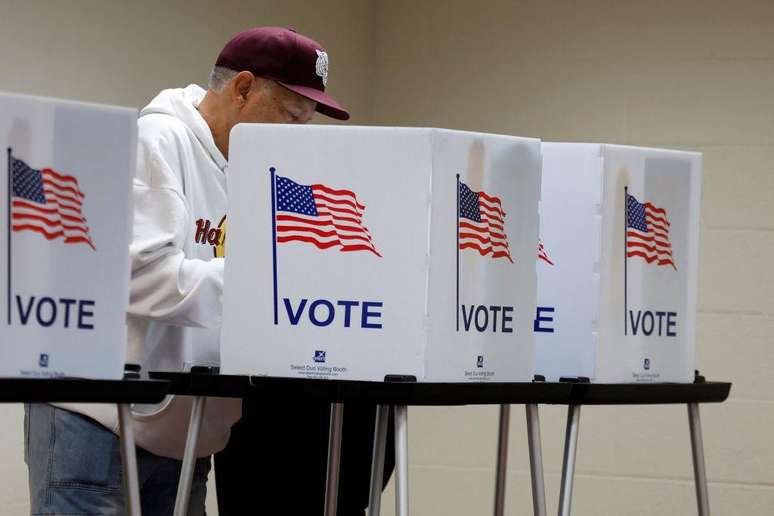Election observers and political analysts say that despite efforts to improve the electoral system, conflict conditions could degenerate into chaos and violence.
There are more than 24 hours until the polls close for the 2024 US election, but the vote counting process that follows is already expected to be slow and tumultuous. In other words, determining the result should take a few days.
This is what election observers who in recent weeks have dedicated themselves to evaluating and strengthening the integrity and security of the system and who will spend the next few days monitoring the work of electoral officials, tell BBC News Brasil.
A number of factors explain the lack of optimism of these professionals in seeing an orderly and peaceful electoral process: the lack of national electoral rules and standards, the slow counting in key states, possible anti-democratic behavior on the part of the candidates themselves, the possibility that there are chains of misinformation, and the reasonable possibility of jurisdiction of the dispute.
In addition, of course, to the story of the 2020 electoral discredit, when almost half of the country was convinced that the elections had been rigged, thanks to the unfounded statements of then President Donald Trump and his allies, who were defeated in those elections.
The trial prompted an unprecedented invasion of Trump supporters into the Capitol as Congress certified Democrat Joe Biden’s victory on January 6, 2021. Despite this, a climate of tension and anxiety remains in the days following the elections, scheduled for November 5.
Federalism
Some of the problems must occur due to the specific characteristics of the electoral race in the United States. The presidential election is indirect, via the electoral college. Each state has a number of electoral delegates, similar to the number of members of Congress they have.
There are, in total, 538 delegates and the candidate who wins 270 wins. In most states, whoever wins the popular vote takes all the delegates the state has; Maine and Nebraska are exceptions to this rule.
Each state conducts voting and counting according to its own rules, in another expression of the federalism that defines the country.
“But what was historically a strength turned out to be the great weakness of the system, the lack of a central authority, which streamlines the process,” one of the election observers on the ground in the United States said in an interview with BBC News Brasil spoke on condition of anonymity because it did not have permission from its organization to comment outside of technical reports.
Again according to this professional, who works in elections in both North America and Latin America, what we see in the United States is a very large discrepancy between procedures and standards of conduct in the electoral process.
“While California follows a gold standard, with a huge guarantee of voter participation and facilities to vote in peace and comfort, North Carolina does the opposite, forcing its voters to face huge lines to vote and remembering what it is considered less advanced in Latin countries”, explains the professional.
Tell
There are seven swing states, those that oscillate between Republican and Democratic candidates, in which the dispute will focus in 2024. The electoral polls suggest an extremely tight scenario between the Democrat Kamala Harris and the Republican Donald Trump in the White House.
For months now, with some numerical fluctuations towards one side or the other, the polls have given both in a virtual technical draw. And this too should complicate the investigation.
“Vote counting could take anywhere from a few days to a few weeks. It will depend on whether there are very close disputes in more than one state. The more states with narrow margins of victory, the longer it should take,” David Carroll said. director of the Carter Center’s Democracy Program, which works directly on American elections.
In some decisive states there is a mandatory recount depending on the size of the difference in votes between one candidate and another. In Arizona and Pennsylvania, for example, if the gap is 0.5% or less of the total votes cast in the state, there is a mandatory recount.

Pennsylvania also allows polling place recount requests, as long as at least three voters submit the request with justification for suspicion of fraud. In Michigan, the law requires a recount if the difference is less than two thousand votes. And in Wisconsin the recount is automatic if the margin of victory is less than 0.25% of the votes.
Nevada, North Carolina, Wisconsin and Georgia also allow candidates to request a recount under certain conditions, such as paying court costs and presenting a credible justification for fraud or processing error.
In Georgia, Carroll said, the Carter Center forms a commission of observers with other organizations that will monitor the vote count and does not rule out a full recount of the state’s ballots if the race is too close.
In 2020, 5 million votes were manually counted, a process that took several days. Then-President Donald Trump publicly and privately pressured local officials for recounts that could challenge Biden’s narrow victory in the state.
The phone call between the Republican and the head of the state’s electoral system in which he asked the server to “find 11,780 votes” in favor of Trump, which would have turned the state towards the Republicans, became famous. For this reason he is facing criminal proceedings, without a verdict yet.
The risk of “I’ve already won”
Election observers note that it is highly unlikely that the two largest swing states, Georgia (16 delegates) and Pennsylvania (19 delegates), will have already tallied their results on election night, 5/11. It is expected that the work will be finished the following Friday, 8/11.
“But it is very likely that one of the candidates will try to claim victory on Tuesday itself, in the face of a partial lead, and will try to characterize a possible breakthrough, when the numbers from Pennsylvania and Georgia come in, as electoral fraud,” he said. said one of the observers interviewed by the report.
Something similar happened in 2020. On election night, directly from the White House, then-President Donald Trump declared that he was the winner of the election. But the total vote count and the release of the final result, which contradicted what Trump had said, would not be released until five days later.
“It remains possible that Trump will encourage his supporters to sow chaos around the vote counting and certification processes, thereby attempting to question the results and create a pretext for extraordinary procedures to resolve a disputed election in his favor,” it says Michael Wahid Hanna, head of the US program at the consultancy International Crisis Group.
Carroll also sees the possibility of something similar happening again now. For him the biggest problem is that this encourages a network of false information that leads people to discredit the electoral process.
Another risk is that belief in a false result inflames voters willing to commit acts of violence. A poll conducted last April by PBS NewsHour/NPR/Marist indicated that one in five U.S. adults agree with the idea that Americans may have to resort to violence to get their country back on the right track.
“In Wisconsin and Arizona we have reports that almost bunkers have been created to protect the election counting areas,” said one of the observers interviewed by the report.
Arizona has become one of the highest points of tension in the country. In Maricopa County, the county that includes the city of Phoenix and which proved crucial in 2020, election officials began receiving constant threats. Trump accused them of manipulating the outcome, which would provoke attacks from his supporters.
There are currently at least five lawsuits alleging threats against Arizona election workers at the Department of Justice.
In 2022, during the midterm legislative elections, while threats persisted, the county deployed six times more police than in 2020 and protected the voting center with barricades, cavalry and even a helicopter.
All these precautions must not only be repeated but even surpassed in 2024. Early last month, a man was arrested for shooting at the Democratic Committee in Phoenix: no one was injured.

Recently, Arizona’s secretary of state, the top local elections official, admitted that for the past four years he “has almost always appeared in public wearing a bulletproof vest.”
And in October, mailboxes containing ballots were set on fire and damaged not only in Arizona, but also in Massachusetts, Washington, and Oregon. Several hundred votes were lost and the case remains under investigation.
Judicialisation of the dispute
Not only is it likely that judges will be called to arbitrate in the 2024 elections, but in reality this is a process that is already advanced.
In the 50 states, almost two hundred cases have already been initiated, both to challenge regulations and to clarify controversial points.
In Georgia, for example, one of the most contested states in 2020, the Legislature even passed a law requiring “officials to manually count the number of votes cast at each polling place on Election Day” so they could then obtaining the same numbers were compared to automatic counts, something that promised not only to delay the process but also to generate widespread distrust because of the possibility of human error in the manual counting of some five million votes.
And the same law also allowed election officials to refuse to certify the result measured in the state. The rule was overturned in court shortly before the current election.
In another action, the Pennsylvania U.S. Attorney’s Office is legally challenging an initiative by billionaire Elon Musk, the platform owner of a pro-gun and free speech poster sponsored by Musk’s political action committee, created to support the Trump’s candidacy.
In the United States, it is illegal to pay for a person’s vote (voting is not compulsory) and to exchange remuneration for choosing a candidate. Musk denies doing so by rewarding those who signed his petition.
Summoned to explain his reasons in court last week, Musk did not show up at the hearing. He is now subject to a coercive condition and it is unclear what decision may emerge after the elections in this process.
Source: Terra
Rose James is a Gossipify movie and series reviewer known for her in-depth analysis and unique perspective on the latest releases. With a background in film studies, she provides engaging and informative reviews, and keeps readers up to date with industry trends and emerging talents.








